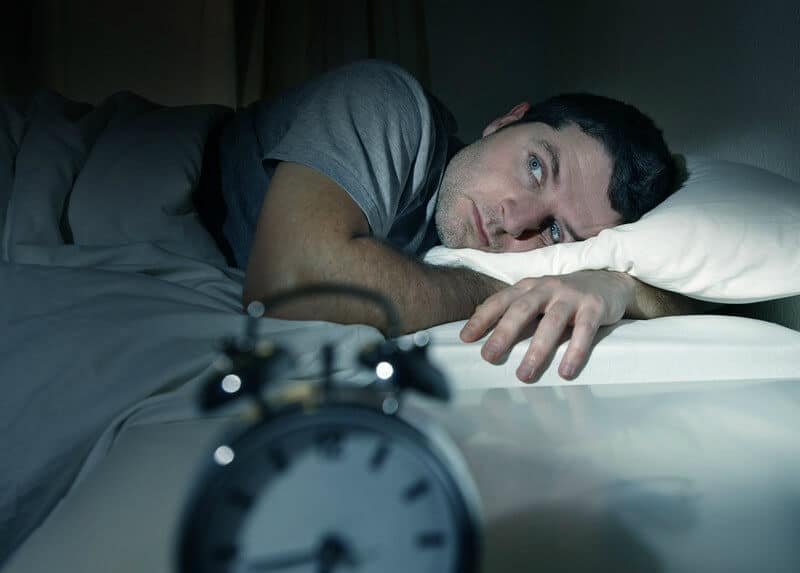—–>Guest post by Sharon Picone<—–
Sleep is essential for health, especially restorative sleep when your body heals and recharges memory. It’s no surprise that sleep deprivation negatively impacts your wellbeing. Being trapped in a sleepless cycle feels like a catch-22. You’d sleep better if you were healthy—but you need sleep to be healthy! So what’s the real story? What causes sleep deprivation and what changes can you make right now to improve your sleep quality?
Reason 1: Insomnia

- Affects one in three Americans.
- Affects older and younger people differently. Younger people struggle to fall asleep, while older people struggle to stay asleep.
- May develop as the result of trauma, stress or a health condition.
Insomnia is easier to treat in the early stages, but often goes unnoticed until it’s become a serious problem. How do you know if you suffer from insomnia? If your sleep problems have lasted more than three months, there’s a strong possibility that you’re an insomniac. Additionally, your daily habits may be perpetuating your problems.
You can treat insomnia by adjusting your sleep environment. Other treatment options include Cognitive Behavioral Therapy (CBT) and medication.
Reason 2: Sleep Apnea

Sleep apnea is an increasing problem. During sleep, breathing stops and starts repeatedly. Your body is deprived of oxygen, preventing restorative sleep. Diabetes or an unhealthy weight also increase your risk of developing sleep apnea.
Sleep apnea:
- Severely affects your attention span, memory, problem solving and
multi-tasking. - Increases your risk of stroke and heart disease.
- Causes an alarming number of traffic accidents where exhausted drivers pass out at the wheel.
Symptoms of sleep apnea include:
- Loud snoring, especially in children
- Fatigue during the day
- Impaired memory
- Frequent use of the bathroom at night
- Consistent nose or throat infection
Reason 3: Obesity
You may already know that obesity contributes to sleep apnea, which ultimately results in sleep deprivation. The latter causes your body to produce ghrelin, an appetite-stimulating hormone that prevents weight loss. Ask your doctor about the C-PAP (Continuous Positive Airway Pressure) device that improves your sleep quality by ensuring you have oxygen throughout the night.
Reason 4: Restless Legs Syndrome (RLS)
Just as the name implies, this is an irresistible urge to move your legs, usually occurring at night. Descriptions of RLS range from ‘burning pain’ to ‘pins and needles.’ The result is the same: decreased sleep and the health problems to match. RLS usually results from an underlying medical issue like iron deficiency. You can treat RLS with supplements, light exercise and massage.
Reason 5: Anxiety
Do anxious thoughts keep you awake? You’re not alone. Sleep expert, Dr. Chris Idzikowski states some ‘sleep disturbances happen as a result of mental activity that we knowingly generate, such as worrying, and such problems can often be tackled directly by learning how to relax and banish the noise of mental chatter.’
Don’t take your worries to bed. Keep a notebook handy and jot down any worries that crop up before you turn the lights off or as you try to fall asleep.
5 Ways To Improve Your Sleep
-
Get to Know Your Internal Clock
If you’ve heard of circadian rhythm, you already know that it’s your internal body clock working to help you experience sufficient sleep at the optimal time. Since your circadian rhythm takes many cues from light, all artificial light throws off your natural body clock, which is bad news for restorative sleep!
-
Nix Blue Light
The biggest culprits are televisions, smart phones, computers and tablet screens, as well as some light bulbs — all of which decrease your production of melatonin, a sleep-promoting hormone. Falling asleep at night and waking up in the morning become more difficult. But removing blue light from your bedroom and banning all social media in the hour before bed hugely improves your sleep.
-
Break Your Bad Habits
Are you a ‘night owl’ or a ‘morning person?’ You may believe you ‘work best at night’ or ‘only need a few hours sleep.’ Dr. Rosenburg, a sleep therapist, has this to say: ‘Despite the benign nickname, [night owls] are suffering from a highly disruptive circadian rhythm disorder known as delayed sleep phase syndrome (DSPS).’
Alternatively, morning people feel alert when they wake, but grow tired in the afternoon and crash early. This cycle is referred to as advanced sleep phase syndrome (ASPS). However, you can change your bad habits by:
Restricting your bed for only sleeping
- Avoiding naps
- Exploring sleep restriction therapy
- Eliminating caffeine, alcohol and other stimulants before bed
-
Change Your Sleep Environment
Make a few changes to your bedroom and follow these tips to dramatically improve your sleep:
- Eliminate as much light as possible
- Use red light, which is less harmful to sleep
- Make sure your alarm clock isn’t visible from your bed
- Cool down your bedroom to mimic your body’s drop in temperature when you sleep. Aim for 68 degrees Fahrenheit (around 20 Celsius)
- Eliminate disturbing noises with earplugs, earphones, or white noise
-
Relax Before Bed

- A warm bath is ideal. It’s relaxing, and the drop in temperature when you get out stimulates sleep. Add lavender essence for even greater relaxation.
- Calm your mind with meditation or yoga.
Conclusion
Even if you suffer from a sleep disorder, it is possible to enjoy better sleep by improving your sleeping habits and environment as well as taking advantage of your body’s natural circadian rhythm.
And the best part? You can start these changes right now!
Resources:
Sleep Soundly Every Night, Feel Fantastic Every Day: A Doctor’s Guide to Solving Your Sleep Problems. Robert S. Rosenberg, Do, FCCP. Demos Medical Publishing, LLC, New York (2014).
http://www.answersforsleep.com/
You Can Sleep Well: Change Your Thinking, Change Your Life. Dr Chris Idzikowski. Watkins Media, UK (2015).
